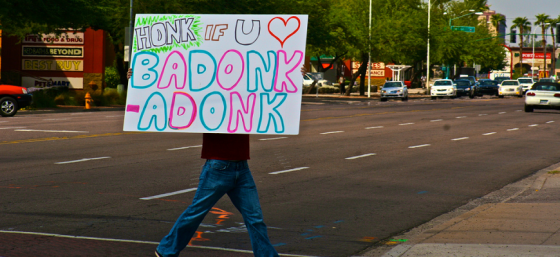Free Speech Week occurs this month!
I was out walking my dog yesterday morning when I received a surprising and disappointing email. I responded with a pretty loud, “FUCK!” I think everyone within a half block of me who wasn’t wearing earbuds heard me. As I finished my walk, I started reflecting on the freedom of speech.
As a flash mobber and an outspoken blogger, I’m grateful we have the freedom of speech in the United States. When I have strong feelings about a topic, I get to express them. People in some other countries aren’t so lucky.
I’m also a big fan of the idea that you have to accept the consequences of what you do and say. Now, I like the word “fuck” as much as I like words like “superfluous” and “misanthropic.” Speech is a wonderful powerful thing. But not everyone likes what I have to say or the way I say it sometimes, but when I say something, I own it. And I completely accept it when people dislike me because I share my points of view. I may not like it when people disagree with me, but I accept it.
My mantra is “Don’t post anything online that you wouldn’t put on the front page of the newspaper.” The same concept applies to anything in public. If you say it, own it. If you realize after the fact that you said something you shouldn’t have, or you shared your view based on incomplete data, apologize for it.
Despite our right to share our feelings and opinions, the freedom of speech isn’t completely free. We accept restrictions on our First Amendment rights based on time, place, and manner all the time. We can’t yell “Fire!” in a crowded theatre where there are no flames present. We can’t threaten the life of the President. We accept that you must be 18 years old to purchase or create pornographic images. I won’t wear my shirt that says “Do Epic Shit” across the back to establishments where children are generally present, or at least I put a jacket over it. We accept these limitations as necessary for the betterment of society.
When we celebrate our right to the freedom of speech, we need to respect others’ right to express themselves too. There are times when I hear people who make my stomach churn and my blood boil and the only thing I can do is walk away, which is not always easy when you live in Arizona. But I respect their right to express their views.
A few years ago I was on a run and I encountered a group of people protesting in front of a Planned Parenthood. As I approached them I cheered, “Go First Amendment!” When one of them offered me a pamphlet, I declined and said, “Oh no. I support abortion.” If I want to dance in the streets and express my views in my forum, I have to respect their right to peacefully protest on public property.




